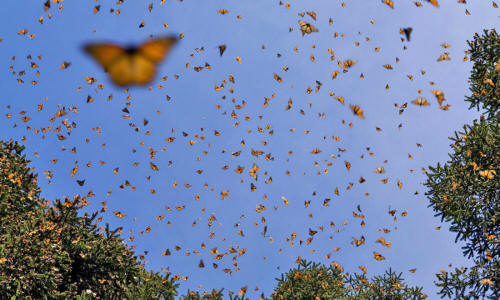|

by Rod Bastanmehr
January 31, 2014
from
Salon Website

The butterfly's numbers are in
decline,
and this agriculture
conglomerate
is destroying their environment
Monsanto may have just found yet
another reason to be hated.
The
Monarch Butterfly's life cycle has
always been in sync with the seasonal growth
of milkweed, which remains the only
plant in the planet's ecosystem that the butterfly larvae will eat.
The emergence of milkweed across the
world has made generations of monarchs travel from Mexico to as far
north as Canada in an effort to feed off of the spring-time plant.
Now, however, the
World Wildlife Fund has announced that the number of
monarchs reaching Mexico in the last year has been falling steadily,
and has reached the lowest level on record, found in 1.7 acres
across 11 sanctuaries, down from the high of 45 acres in 1996.
The reason is simple:
As Slate reports, the monarch
population began to steadily sink as a result of grasslands
rapidly being wiped out in favor of corn and soybean fields - a
rate of loss, the report states, comparable to the deforestation
of Brazil and Indonesia.
Monsanto Company's well-known, utterly
toxic
Roundup Weed Killer is largely to
blame for the decline, since it kills everything around it including
milkweed, which is down by 80%.
"We have this smoking gun," said
Karen Oberhauser, a conservation biologist at the University of
Minnesota. "This is the only thing that we've actually been able
to correlate with decreasing monarch numbers."
While there have been a number of
other possible scenarios for the butterfly's disappearance (two
years of unusual spring weather in the United States, and
fluctuating dismally cold and scorching hot weather patterns),
the substantial loss of milkweed seems to be the most likely
cause.

There are still places in the United
States that have an abundance of milkweed (there are only slight
decreases in the number of monarchs in New Jersey and northern
Michigan) but if the general notion of how big business
agriculture is changing the landscape of our world's ecosystem
doesn't change - drastically - then the Monarchs may just be the
be one among many to go.
|


